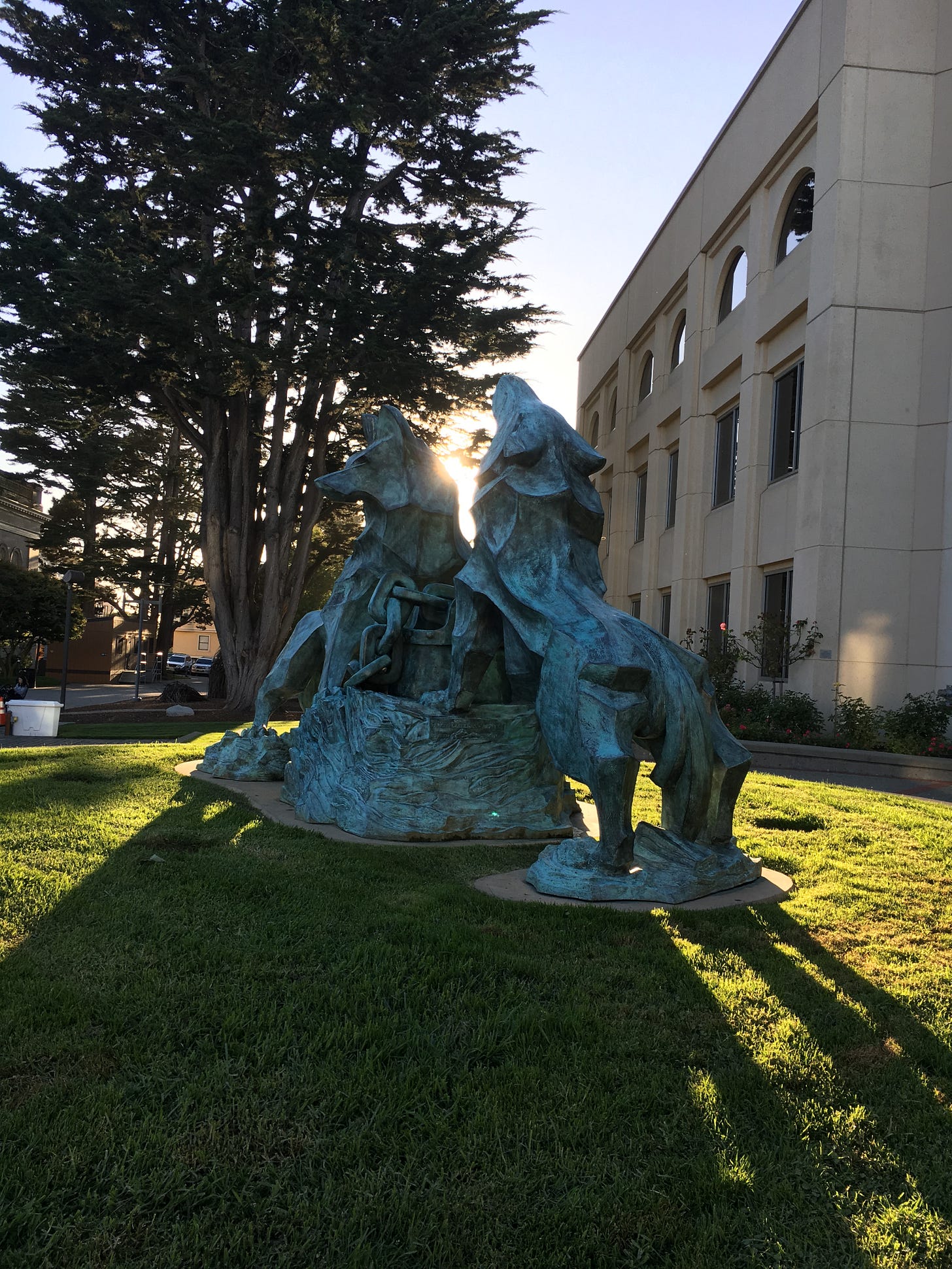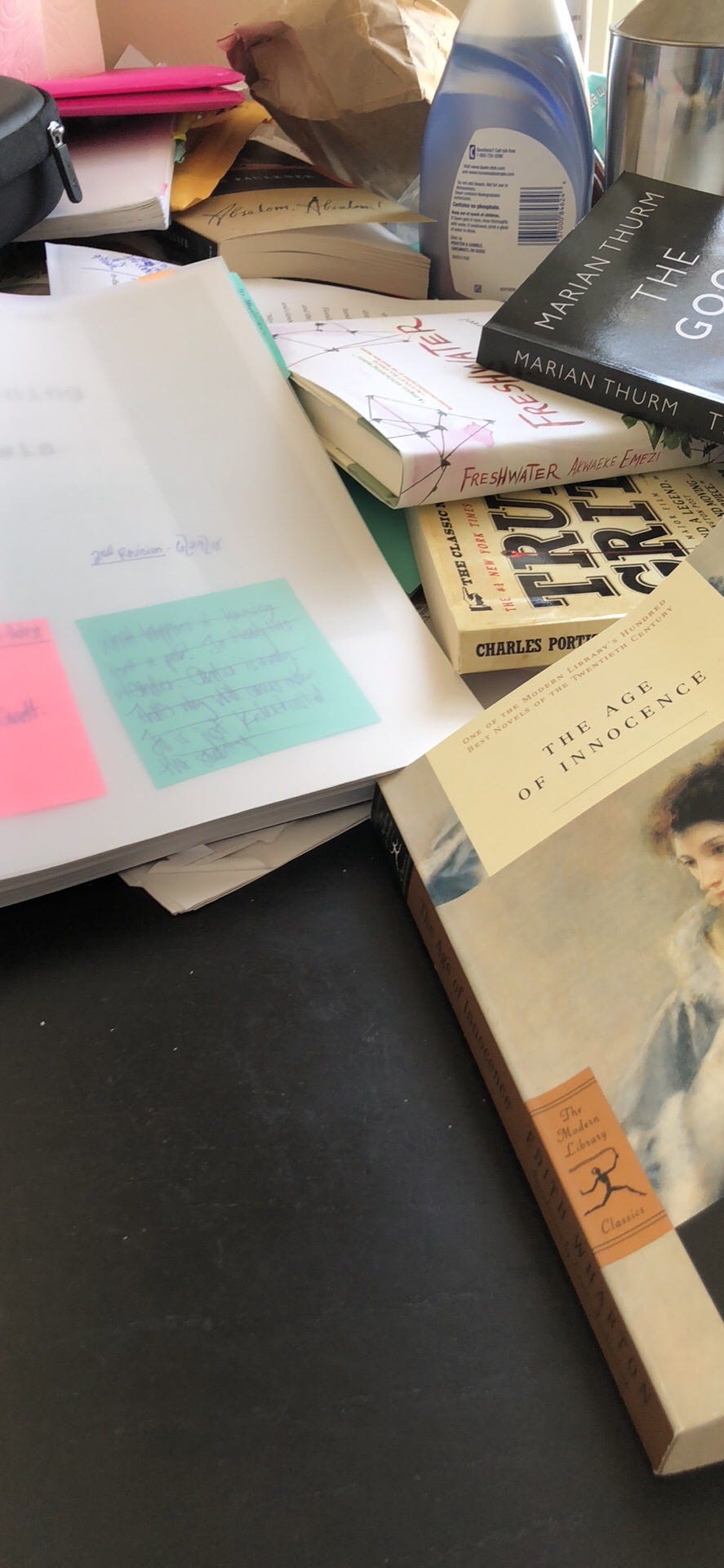I’ll cut to the chase. I got an MFA for one reason and one reason only: to teach at the university level. Everything else that comes with an MFA—community, teaching experience, an in-depth study of craft—is all extra because you can get these things elsewhere for cheaper. That said, the MFA was still perfect for me, and I’d go back and do it again 100 times over. Even though going to grad school was the best decision I’ve ever made, the realities of a graduate degree in creative writing did not align with my expectations.
Today, I’m launching a series of posts about my MFA experience and the pros and cons of this degree. This week’s post will break down the three most important things I learned during my MFA. Next week, we’ll dive into three things I wish I had known going in.
For context, I did my first year at the University of San Francisco before transferring to the University of South Florida to finish my degree. I’ll be talking about my experience at both programs in this post. If you’re interested in seeing a post about why I transferred, drop a comment below to let me know.
The Value of an MFA
1. Professional Development
In general, there are two minimum qualifications for tenure-track jobs in the US. The first is a terminal degree in creative writing (either an MFA or a PhD). The second is a book in contract with a national publisher. During my first semester at San Francisco, I learned all the nitty gritty details of the application process.
That semester, I took Beth Nguyen’s Professional Development class, and she taught our class everything we needed to know about publishing and pursuing a tenure-track job at an American university. In addition to learning the various application requirements, we also learned how to put together our application package, how to prepare for each step of the interview process, and most importantly, how to conduct ourselves during campus visits. Beth’s class is one of the most valuable classes I’ve taken because it taught me the concrete steps I needed to take in order to reach my goal of becoming a college professor.

Applying for MFA programs?
Elevate your application with our self-paced Personal Statement course!
2. Project Management
Since I transferred programs, I ended up with two thesis advisors: Lewis Buzbee at San Francisco and John Henry Fleming at South Florida. San Francisco structured its thesis program in a unique way. During the summer term after your first year, you take Thesis I, and then the last semester of your third year you take Thesis II with a different advisor. Each thesis advisor has slightly different requirements. My requirements included four meetings with Lewis and a writing submission ahead of each meeting. In preparation for our first meeting, Lewis had me write a letter that established three things:
My Concrete Goals for the Summer
My Current Challenges with My Book
My Reading List for the Summer
Lewis asked that we write 120 pages by the end of the summer. In my letter, I wrote that I would write 40 pages to finish the second draft of my novel and then use the rest of the summer to write the first 80 pages of my next draft. As for my challenges, I acknowledge the problems my book had and how I might solve them on a craft level. Within the context of these craft issues, I explained why I chose the three books on my reading list and what I hoped to learn from each of them.
Over the course of the summer, Lewis and I met once a month at Tart to Tart in the Sunset and discussed the 40 pages I turned in. Outside of our meetings, I was completely on my own to manage my writing time and reading load. This experience taught me how to apply concrete project management skills to a creative endeavor. Project management is the number one skill that I use every day as a narrative designer for video games, and I owe a lot of my professional success to the hard skills I gained at San Francisco.

At South Florida, the thesis program is broken into nine credits. I took three credits in the fall of my final year and six in the spring. The year before we started our first thesis semester, the program had us submit a writing sample, a prospectus that summarized our thesis project, and a rank list of faculty members we wanted for our thesis committees. Thesis committees at South Florida consist of a thesis director and two readers. The director provides feedback on your thesis in a similar way to how I worked with Lewis at San Francisco. As for the two readers, they typically read your manuscript once and provide macroscopic feedback on your work.
This experience was incredibly valuable because it taught me how to manage my writing time while teaching. During my last semester at South Florida, I taught two undergraduate courses. I also took a graduate workshop and six thesis hours to finish up my manuscript. This experience somewhat simulated what life would be like if I stayed in academia instead of pursuing industry work. It also affirmed that (1) academia was the right fit for my professional interests and (2) I had the independent project management skills necessary to succeed in this field.
3. Pedagogy
I chose South Florida when I was transferring because it has an excellent pedagogy program. It also provides students with hands-on teaching opportunities. During my MFA, I taught a 2/2 course load where I was the instructor of record instead of just an aide to the professor. I also had the opportunity to develop and teach my own creative writing courses.
The program at South Florida offers several pedagogy courses for different disciplines in the English department. I took the composition and creative writing courses and learned the best practices for syllabus writing, course design, and minute-by-minute lesson planning. Since taking these courses, I’ve systematically designed every lesson (including the craft lessons in this blog) using the practical pedagogical approaches we studied in class.
My favorite class was Heather Sellers’ creative writing pedagogy course. My main takeaway from Dr. Sellers’ class was the importance of rubrics. She taught us how to apply a concrete rubric to creative assignments, and she demonstrated how rubrics can streamline our grading process. In general, rubrics are important to my pedagogy because responding to student writing is so fun for me. During my first semester teaching, I’d write long responses to my students’ writing and have very little time to work on my own book or coursework. Rubrics, however, helped me keep my grading time manageable. They also helped my students see how effectively they’re applying the concrete craft concepts of each lesson to their assignments.
If you’re interested in learning more about creative writing pedagogy and how I use rubrics in my classes, leave a comment to let me know.
Recap: Is an MFA Worth It?
You can learn how to write, teach, and build community outside of an MFA program.
I got an MFA in order to teach at the university level.
Here are the three most important things I learned during my degree:
Professional Development
Project Management Skills
Creative Writing Pedagogy
Next week, I’ll break down the three things I wish I knew before starting my MFA, and I’ll summarize the general pros and cons of getting a master’s in creative writing.
What’s going on in your writing life right now? What experiences outside of writing taught you professional development or project management skills? Is anyone interested in creative writing pedagogy posts?
Tell me what’s happening out there in the world and what you want to see here in future posts.
See you next week,
Kat





I got my MFA for the same reason—to teach in a university. We didn’t have an opportunity to learn about creative writing pedagogy so I’d definitely be interested in reading about that. I’m also wondering why you transferred. It hadn’t even occurred to me that was possible.
Thank you for the concise and structured post. I look forward to your content because it is creative yet works within parameters and that is how my brain likes to see and organize things. I'm creative and messy, but if I could have a spreadsheet and some structure organizing me, even better.
I have considered going for an MFA, but not sure it's necessary for me, particularly as my goals are not well-defined (see the messy part above). The way you've described still makes it enticing but at this point in my life, I don't have the bandwidth or steering desire to pursue teaching at the university level, so I think I've done the right thing in not going for the degree. That said, I'm always interested in learning more about the craft of writing, so I appreciate your content and other solid writing advice I've found online.